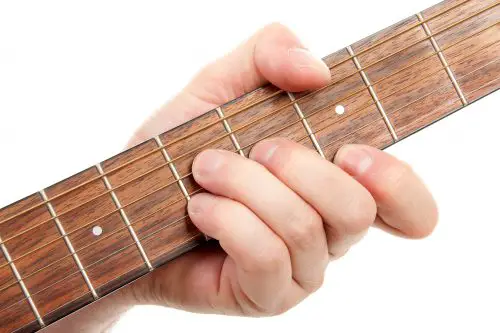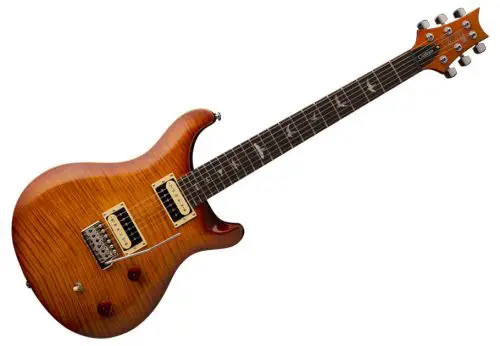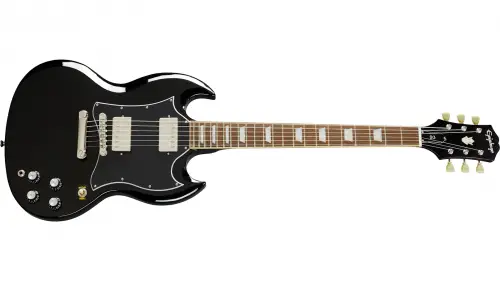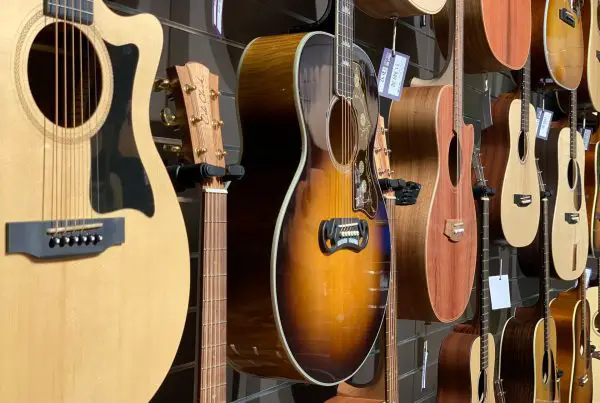The playability of the guitar does not depend on thickness of the neck – it is purely preference. Tone difference is only present when two different guitar necks made from the same wood are compared.
There is no rule if the thick or thin guitar neck is more comfortable to play or not. Every guitarist has its affinities, favorite techniques, and different hands.
However, the thickness of a guitar neck changes the tone of the guitar slightly – the ticker guitar neck has more response and better tone.
There isn’t necessarily a better or worse tone – the tone is simply different, and people choose the neck thickness due to the sound they prefer.
I played on two guitars with different neck thicknesses, and I found the thinner neck more comfortable, while my mate said the thicker one better suits him, even if he has smaller hands than I do.
Also, I’ve compared sounds, and I can say the neck thickness indeed fleshes itself out in response and tone.
In this article, I’m explaining the difference in more detail. You will learn something new and enrich your knowledge and way of playing and choosing the instrument. The article covers:
- Is It Better To Have A Thin Or Thick Neck On The Guitar?
- Are Thin Guitar Necks Good?
- Are Thinner Neck Guitars Easier To Play?
- Is A Thicker Guitar Neck Better?
- Why Do Shred Guitars Have Thin Necks?
- Do Les Pauls Have Thick Necks?
- Can A Guitar Neck Be Too Thin?
- Which Epiphone Les Paul Has The Thinnest Neck?
- Does A Strat Have A Thinner Neck Than A Les Paul?
- Does Guitar Neck Affect The Tone?
- Conclusion
Is It Better To Have A Thin Or Thick Neck On The Guitar?
There is no objective thing about thin or thick guitar necks. Some guitarists find thick guitar necks more comfortable to play while others don’t. It’s all about preference.
The preference is based on the player’s size of the hands, preferred technique, and other circumstances.
One guitar player said: “For me, a thicker neck is desirable. I have some left-thumb arthritis, and thin necks exacerbate the arthritis trouble”, while the other one said: “Thin neck tends to make my left hand more relaxed and much smoother hand movement.”
So, it’s a purely subjective thing.

Thin guitar necks are suitable for fast play. Whereas thick necks are for rhythmic playing with good hand support.
Here are 3 factors to decide which guitar thickness is suitable for you: The thin or thick neck?
1. Playing Style
Thin guitar necks are suitable if you play fast or like to tap on the guitar. Thin necks are generally better for players in metal and jazz genres.
Whereas thick guitar necks are better for rhythmic styles of playing guitar because thick necks provide support for your hand – allowing you to be more relaxed when forming chords.
2. Hand Size
Thin guitar necks are more suitable for people with shorter fingers – it will feel more comfortable, your thumb can rest on the neck easier and you can reach all strings without much effort.
Whereas thicker guitar necks are suitable for people with longer or bigger fingers. You would have more space to place your fingers and rest on it.
Throughout my guitar circles, I constantly hear my friends complain about not having enough space to put their fingers on thinner necks (and they are mostly guys).
3. Entry-Level Players
A beginner who has just started to learn barre chords is going to struggle on the thicker guitar neck, while the thinner one will require less effort.
But this is not a rule – some players may feel different, especially beginners with bigger hands.
Are Thin Guitar Necks Good?
Thin guitar necks are good, but you can’t say they’re better or worse than thick ones, in general.
Most beginners find a thin guitar neck more suitable to practice and learn barre chords.
Entry-level players are more likely to play chords clearly because of the easier reach. As I said, everything about neck thickness is a subjective thing.
Also, many people who prefer a tapping style or play complicated note sequences say a thin guitar neck helps them play those things more effectively. Of course, there is another group of people who say the opposite.
Are Thinner Neck Guitars Easier To Play?
Thinner neck guitars can be easier to play for some guitarists, which is based on their preferred playing style, hands’ size, subjective feel, and experience.
So, some players will find the thin guitar necks easier for playing and practicing, while others will say the thick ones are the best ones.
As I said, a tapping style or complicated note sequences are easier to play on a guitar with a thinner neck.
Also, a thin guitar neck makes playing easier for those who want to shred or solo at speed.
Short fingers are more likely to reach the string and play it clearly by playing and practicing on a guitar with a thinner neck. Long fingers and bigger hands require thicker-neck guitars for better hands’ support.
But, there will always be a group of people who don’t follow these words, so the subjective feel plays the biggest role.

Thin or thick guitar necks are usually personal preference – it’s not science!
Is A Thicker Guitar Neck Better?
A thicker guitar neck can be better for some guitarist players, which is based on their preferences and hands’ physiognomy.
I can’t say the thicker guitar is better or worse than the thin one, in general. It’s a fact it’s better for more vintage sound songs, rhythm playing style, slower playing, power chords, longer fingers, bigger hands, but some guitar players have another feel and affinities.
Why Do Shred Guitars Have Thin Necks?
Shred guitars have thin necks because shredding requires more speed, and a thin neck is considered the one for faster playing.
Fast playing is possible if the hand has a comfy and proper hand position. The neck thickness has nothing to do with speed. It’s all about comfort.
So, there is only one adequate neck thickness for shredding. It’s the one who works the best for the guitarist when shredding.
In my opinion, manufacturers should start making more shred guitar models with neck thickness variety to help guitarists find a proper guitar according to their needs. It’s like having just one-size jeans, and everyone needs to fit in them.
Does Guitar Neck Affect The Tone
The Guitar neck does affect the tone, but I’m not sure a neck difference would be super noticeable compared to the impact of a guitar set-up, pickups, amps on a guitar sound.
But yes, the impact exists. It is noticeable when you compare two guitars with neck thickness differences but made from the same wood.
With the same wood, the thicker the neck is, the greater the stiffness is. The stiffer the neck is, the less it participates in the vibration of the overall system, and therefore the sound is with more sustain.
Also, the more the mass of the neck is, the lower its resonant frequency is, which fleshes itself out in response and tone.
It’s a fact that a thicker neck affects the tone in a way of getting the sound slightly darker. Besides that, it produces a fuller, louder tone. I’ve played on a 50s Les Paul, and I can say it has a low-end push, too. A guitar with a thinner neck has a lighter, snappier sound.
Can A Guitar Neck Be Too Thin?
A guitar neck can be too thin if the guitar player doesn’t feel comfortable playing on it.
Guitar players with longer fingers will probably feel uncomfortable wrapping around the whole neck unless it’s a part of their preferred technique. Also, a guitar neck can be too thin if it doesn’t suit the guitarist’s playing style and genre.
Some guitarists who love shredding say the neck is never slim enough for it. For them, a guitar neck can never be too thin.
The same thing counts for ‘too thick’ guitar necks. If the guitarist finds the neck too thick and uncomfortable, that can be solved by shaving it.
Do Les Pauls Have Thick Necks?
It’s a well-known fact that Les Pauls’ necks are chunky. Traditional 50s Les Paul, Les Paul Supreme, Pre-’59 Historic Reissues are one of the Les Paul guitars that have thick guitar necks.
The 50s neck is thicker than the one from the 60s. The Les Paul Traditional guitar was discontinued in 1961 and has been split into two Standard guitars: with the 50s and 60s flavors. The major difference is in the neck – the 50s guitar has a more vintage, thicker neck.
So, if you’re searching for the Les Paul with a thicker guitar neck, search for a 50s tribute. Also, most of the US Les Pauls with a 50s guitar neck have a number five in the product code.
Therefore, some Les Paul guitars can be challenging for small-handed players because of the neck thickness, especially Gibson and Epiphone Standard 50s, Tribute, and Junior. But, everything has an exception – try different guitars and choose the most comfortable one for your hand.
Which Epiphone Les Paul Has The Thinnest Neck?
he guitars with the 60s are the thinnest ones among Epiphone Les Pauls. They also have a neck profile called a slim taper.
A 60s neck is quite thin and comfortable to play with too many people, especially ones with small hands/short fingers and those who prefer tapping style.
Slim taper is also the thin neck profile, and many guitar models have both 60s and slim taper neck profiles.
As I said for the 60s, slim tapers are suitable for many people too, including ones who love tapping style, and that’s why these necks are called slim tapers. You can find one slim taper neck in Angus Young’s collection.
Some of these guitars are Epiphone SG Standard, Tribute Plus, and Ultra guitar.
Epiphone SG Standard
This guitar is an actual recreation of the legendary 1960s classic that powered the first generation of hard rock and heavy metal.
Epiphone Les Paul 1960 Tribute Plus
Epiphone LP 1960 Tribute Plus is a guitar that is known for being one of the best sounding and playing guitars Epiphone has ever made. Its neck is made from mahogany with a 60s slim taper D profile.
Epiphone Les Paul Ultra
It’s introduced in 2005 as the first and the only series of chambered LP guitars. It has a satin slim taper maple neck. The guitar is quick to play and remarkably easy and comfortable to hold.

Epiphone SG standard has a thin neck – suitable for fast play.
Does A Strat Have A Thinner Neck Than A Les Paul?
A Strat has a thinner neck than a Les Paul. The Strat tends to use a C neck profile, while the Les Paul tends to use a U neck profile.
Both these guitars are very popular in the music world and are determined as dream guitars for many guitarists.
You can’t say the neck of the Strat is better than the Les Pauls and reverse. It’s a personal thing because some guitarists prefer the C shape while others the U shape of a Les Paul. But, a mass of guitarists finds the C shape and the thickness of the Strat’s neck easier to play.
A neck profile can have an impact on the playability of the guitar, but it’s hard to say which neck profile will feel better and easier to play as every guitar player has different preferences than others.
Conclusion
A neck thickness does affect the playability and sound, too. The playability is something subjective – someone finds the thicker neck better than the thin one or reverse.
You can’t say one guitar has better playability than another one and be sure that opinion will help your friend when choosing which guitar to buy. It’s just your opinion, your feelings, and your affinities and preferences. So, when buying the guitar, try many models and listen to yourself only.
You can hear the sound difference only if you compare two guitar necks made from the same wood. But, the sound difference as a product of the neck thickness is pretty negligible compared to the impact that a guitar, pickups, amps have on the sound.
So, if you need a fuller and darker tone, that doesn’t mean you just need to replace the guitar neck.
Many of us get hung up on neck shape, and if ‘big’ is essential to you then the ’50s ticks that box. Listening acoustically is quite revealing. The ’50s has a vibrant if slightly brash voice.
There’s a lot of crossover to be found in the new batch of models. There’s no doubt the ’50s is the statelier choice, wrapped in a rich low-end and slightly pulled back on the sizzle.






